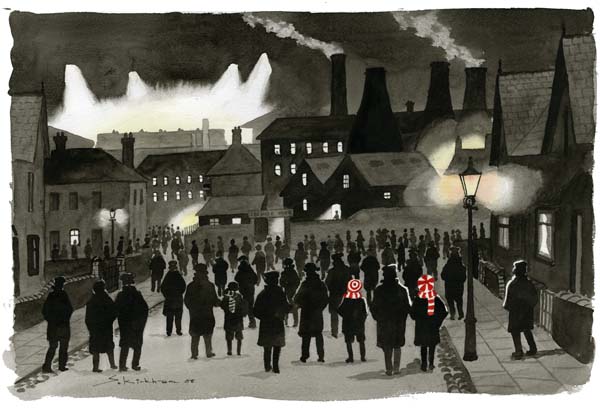|
Knype
- Bennett's Stoke
|
Knype is the name
Arnold Bennett gave to the Potteries town of Stoke-upon-Trent in his
Five Town novels.
"Edwin
and Janet stood together on the windy and bleak down-platform of
Knype Station, awaiting the express, which had been signalled. Edwin
was undoubtedly very nervous and constrained, and it seemed to him
that Janet's demeanour lacked naturalness. Then the train appeared,
obscure round the curve, and bore down formidable and dark upon
them, growing at every instant in stature and in noise until it
deafened and seemed to fill the station; and the platform was
suddenly in an uproar." |
The Loop
Line
Bennett made use of the
Potteries loop line that during the late 19th century provided a much
needed form of transport between the towns. The loop line emanated at
Stoke Station.
"In a
second-class compartment of the Loop Line train with Sophia and Fossette
opposite to her, Constance had leisure to 'take in' Sophia. "Well I
never!" cried Sophia, suddenly. She had glanced out of the window and
had seen two camels and an elephant in a field close to the line, amid
manufactories and warehouses and advertisements of soap. "Oh!" said
Constance. "That's Barnum's, you know. Hey have what they call a central
depot here, because it's the middle of England." Constance spoke
proudly.
Sophia
hit on the excellent idea of noting all the buildings that were new to
her and all the landmarks that she remembered. It was surprising how
little the district had altered. "Same smoke!" said Sophia. "Same
smoke!" Constance agreed. "It's even worse" said Sophia. As the train
puffed under Trafalgar Road, Constance pointed to a new station that was
being built there, to be called 'Trafalgar Road' station. " Won't it be
strange?" she said, accustomed to the eternal sequence of Loop Line
stations - Turnhill, Bursley, Bleakridge, Hanbridge, Cauldon, Knype
Trent Vale and Longshaw. A 'Trafalgar Road' inserting itself between
Bleakridge and Handbridge seemed to her excessively curious. She
indicated the glories of Bursley Park, as the train slackened for
Bursley, with modesty. "

 see more
on the Potteries Loop Line
see more
on the Potteries Loop Line
Football
Stoke City Football Club
dates back to 1863 and is the second oldest association club in the
country. The former "Victoria ground" in Boothen Old Road, produced 31
internationals, including the great Sir Stanley Mathews. Arnold Bennett
exploited the adherence of loyalty that's come to symbolise the almost
fanatical support the club enjoys from its supporters, in the jovial novel
"The Card."
"There
were two "great" football clubs in the Five Towns - Knype, one of the
oldest clubs in England, and Bursley. Both were in the League, though
Knype was in the first division, whilst Bursley was only in the second.
Both were, in fact, limited companies, engaged as much in the pursuit of
dividends, as in the practice of the ancient and glorious sport which
appeals to the reason and the heart of England. Neither ever paid a
dividend. Both employed professionals, who, by a strange chance, were
nearly all born in Scotland ; and both also employed trainers who,
before an important match, took the teams off to a hydropathic
establishment far, far distant from any public house. This was called
training.
Now,
whereas the Knype Club was struggling along fairly well, the Bursley had
come to the end of its resources. The great football public had
practically deserted it. The explanation, of course, was that Bursley
had been losing too many matches."

the Potters on their way
to a Stoke match
(Bennett's Knype)
(picture: Sid
Kirkham)
Bennett observed that to the
people of the Potteries football was an all abiding passion. He wrote in
his journal;
"Grown
men no longer play at marbles, as they used to when I went to school. Of
the more ancient diversions, pigeon-flying alone remains a very harmless
hobby. Football alone reigns supreme and has no serious rival. The
potteries was one of the first centres of football, and in the history
of the Association game, the name Stoke on Trent is glorious.
Football has the characteristics of force and violence and spectacular
bigness which could not fail to attract a race as the potters. Cricket
is much practiced, and golf waxes yearly, but there is nothing like
football in North Staffordshire."
 |
![]() | Bennett Index |
| Bennett Index |![]()
![]()
![]()
![]()
![]()
![]()